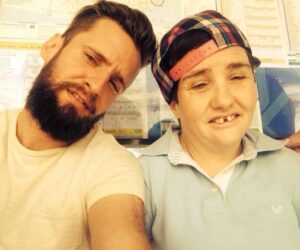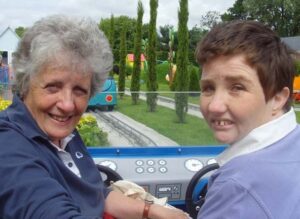Claire Steeples is 44, she lives on the south coast in a purpose built bungalow next to her parents’ home. Claire was introduced to PECS 10 years ago, at the age of 34. Proof that it is never too late to start PECS, and that it is suitable for all ages, not just small children. Claire lives an active life; sailing, swimming, baking and discos regularly feature in her day.
Her brother Robert, and sister in law Amy take up her story.
Early Years

Robert and Claire
In 1977 our sister Claire was born. Following complications and lack of oxygen at birth she was left with a brain injury and a severe learning disability. Our father worked for the Foreign and Commonwealth Office (now known as the Foreign, Commonwealth & Development Office), and was given various postings in Europe, so Claire was found a suitable residential school which could provide the right level of care and education. School progressed well and staff worked effectively with Claire, by getting to know her and drawing out the best in her. However, as Claire got older and moved into adult residential settings, the care and support changed. One-to-one support was almost non-existent and previously nurtured skills were lost and forgotten including her communication. Until then, Claire had a limited range of words she used to communicate her wants and needs, she even spoke to her family on the phone.
During her time in adult services, she became isolated as support and encouragement stopped. Her anxieties increased and so did her challenging behaviour. She had no control or choice over her day, had no way to communicate and no support was put in place to help her understand what was happening. Staff regularly reported that she was too old to learn new skills and was written off. This escalated over the years that she spent in adult social care and led to her pulling out half her hair. She went on to develop strong challenging behaviours that we still see at times today. When Claire was 30 we decided that enough was enough, and we removed her from the residential care system.
Introducing PECS
We bought a small house and began setting up a caring environment around her that was person centred to meet all her needs, in particular communication. Robert set about introducing her to
Since then our whole family have spent time campaigning for personalised care and the rights of adults with learning disabilities, particularly for support with communication. We regularly attend conferences and forums, telling our story and helping other families. We have won two accolades from Skills for Care for our efforts and designing a new model of working. In 2015 we were invited to London to meet with Sir Simon Stevens, head of the NHS to talk about personalisation in the adult care world. Claire communicated with him using PECS and showed off her newly found voice. Now, at age 44, her communication book is central to her life and is absolute proof that it is never too late to start PECS. Throughout the day she will select images of activities she would like to do, items she has lost, requests for a snack or drink – or even to ask for bath and bedtime! She knows that when she uses her symbols she can communicate what she needs and that this will be listened to and get a response.

Claire and her Mum, Jenny
Introducing the Concept of NO!
At times she can’t always have what she has requested such as numerous ice creams! But that begins a conversation, and we can help her to understand why that can’t happen or build it into her schedule for later in the day. Her visual schedule grew in importance during the pandemic as routines stopped overnight and activities were stopped. Claire was unable to go horse riding or to a disco for over a year and access to the swimming pool and physiotherapy was very limited. She often requests to go to the zoo or to see her friends but for a long time this was just not possible. The pandemic has been a challenge, but she has been resilient and adapted well to these changes, finding new interests in crafting, baking, dog walking and a huge love of virtual sessions! Now when Claire requests friends or one of the specific people photos we have created for her, we give them a video call and say ‘hi!’ Claire’s life has changed vastly and all for the better. She now has a life, not just an existence and most importantly, she has the power of communication.
You can read more about Claire on her website.
Thank you to Carousel, the Diplomatic Service Families Association magazine, for kindly allowing us to base this blog on an article that they previously published.
Many thanks to the Steeples family for allowing us to share Claire’s story.
Originally written by Robert and Amy Steeples
Edited by Louise Hotchkiss
© Pyramid Educational Consultants
